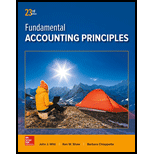
Concept Introduction:
Adjusting entries:
Multiple-step income statement: It is one of the most commonly used methods to derive the net income as it uses multiple subtractions under multiple heads. It gives more and appropriate information to the users of the financial statement.
Single-step income statement: It is one of the simple methods to derive the net income as it uses just one subtraction. It takes all the revenues together and deducts all the expenses in one shot without bifurcating them under different heads.
Acid test ratio: It is also known as the
Gross margin ratio: It depicts the margin that a business is earning from its operating activities in terms of percentage of net sales.
To Prepare/Determine:
- Adjusting journal entries at year end for the given merchandise activities.
- Multiple-step income statement for fiscal year 2017.
- Single-step income statement for fiscal year 2017.
- The different ratios like current ratio, acid- test ratio and gross margin ratio.
Explanation of Solution
- Adjusting journal entries-
| S. No. | Particulars | Debit | Credit |
| a | Store supplies expense | $4,050 | |
| To Store supplies account | $4,050 | ||
| b | Insurance expense account | $1,400 | |
| To Prepaid insurance account | $1,400 | ||
| c | Depreciation expense account- Store equipment | $1,525 | |
| To Accumulated Dep- Store equipment | $1,525 | ||
| D | Inventory shrinkage expense account | $1,600 | |
| To Inventory account | $1,600 |
- The multiple-step income statement-
| Income Statement of Nelson company |
||
| Sales Revenue: | ||
| Gross Sales | $111,950 | |
| Less: Sales discount | $(2,000) | |
| Less: Sales returns and allowances | $(2,200) | |
| Net sales | $107,750 | |
| Less: COGS | $38,400 | |
| Less: Inventory shrinkage expense | $1,600 | |
| Gross Profit | $67,750 | |
| Operating Expenses | ||
| Selling Expenses: | ||
| Depreciation expense- Store equipment | $1,525 | |
| Advertising expense | $9,800 | |
| Store supplies expense | $4,050 | |
| Administrative expenses: | ||
| Salaries expense | $35,000 | |
| Insurance expense | $1,400 | |
| Rent expense | $15,000 | |
| Total Operating expense | $66,775 | |
| Net income | $975 | |
- The single-step income statement-
| Income Statement of Nelson company |
|
| Revenue: | |
| Sales Revenue | $107,750 |
| Expenses | |
| COGS | $38,400 |
| Inventory shrinkage expense | $1,600 |
| Depreciation expense- Store equipment | $1,525 |
| Advertising expense | $9,800 |
| Salaries expense | $35,000 |
| Insurance expense | $1,400 |
| Rent expense | $15,000 |
| Store supplies expense | $4,050 |
| Net Income | $975 |
- The current ratio, acid test ratio and gross margin ratio
Want to see more full solutions like this?
Chapter 5 Solutions
Fundamental Accounting Principles
- Selby Industries has a standard requirement of 4 direct labor hours for each unit produced and pays $12 per hour. During the last month, the company produced 1,200 units of its product and paid a total of $60,480 in direct labor wages. The labor efficiency variance was $720 favorable. What was the direct labor rate variance? Helparrow_forwardGiven true answer general accountingarrow_forwardCompute the correct cost of goods sold for 2022arrow_forward

 AccountingAccountingISBN:9781337272094Author:WARREN, Carl S., Reeve, James M., Duchac, Jonathan E.Publisher:Cengage Learning,
AccountingAccountingISBN:9781337272094Author:WARREN, Carl S., Reeve, James M., Duchac, Jonathan E.Publisher:Cengage Learning, Accounting Information SystemsAccountingISBN:9781337619202Author:Hall, James A.Publisher:Cengage Learning,
Accounting Information SystemsAccountingISBN:9781337619202Author:Hall, James A.Publisher:Cengage Learning, Horngren's Cost Accounting: A Managerial Emphasis...AccountingISBN:9780134475585Author:Srikant M. Datar, Madhav V. RajanPublisher:PEARSON
Horngren's Cost Accounting: A Managerial Emphasis...AccountingISBN:9780134475585Author:Srikant M. Datar, Madhav V. RajanPublisher:PEARSON Intermediate AccountingAccountingISBN:9781259722660Author:J. David Spiceland, Mark W. Nelson, Wayne M ThomasPublisher:McGraw-Hill Education
Intermediate AccountingAccountingISBN:9781259722660Author:J. David Spiceland, Mark W. Nelson, Wayne M ThomasPublisher:McGraw-Hill Education Financial and Managerial AccountingAccountingISBN:9781259726705Author:John J Wild, Ken W. Shaw, Barbara Chiappetta Fundamental Accounting PrinciplesPublisher:McGraw-Hill Education
Financial and Managerial AccountingAccountingISBN:9781259726705Author:John J Wild, Ken W. Shaw, Barbara Chiappetta Fundamental Accounting PrinciplesPublisher:McGraw-Hill Education





